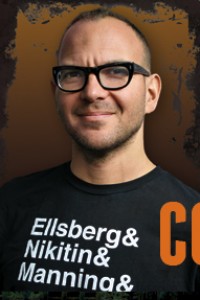Spotlight on Andy Weir, Author

Andy Weir was first hired as a programmer for a national laboratory at age 15 and has been working as a software engineer ever since. He is also a lifelong space nerd and a devoted hobbyist of subjects like relativistic physics, orbital mechanics, and the history of manned spaceflight. First novel The Martian was a bestseller and was adapted as a popular feature film. New novel Artemis is out this month.
Your first novel, The Martian, was published as a serial on your website before becoming a bestseller and a feature film. Why did you decide to self-publish initially?
Earlier in my life I had made serious attempts to break into the fiction world, but failed every time. I eventually gave up and decided that my writing would be a hobby from then on, so I posted my stories on my website. I never imagined that the book would get as popular as it did.
Tell us how the success of The Martian has impacted your life as a writer (and otherwise). Has it provided interesting opportunities or challenges?
Well, I’m a full-time writer now. I was a software engineer for 25 years, and I only left that job when it was clear that revenue from The Martian would support me. I think the biggest change would be my daily work life. I used to work in an office with a lot of other people, and I enjoyed that teamwork and social atmosphere. I liked my job quite a lot, actually. Now, though, I just sit at my computer in my home office and I work alone. That’s rough for me, because I’m a pretty social guy. It’s been an adjustment, to be sure.
What drew you to write hard science fiction instead of, say, epic fantasy or literary fiction?
I’ve always been a sci-fi fan, and I’m a total science dork, so I definitely had an interest in writing within that genre. While I do enjoy reading fantasy, I don’t think I’d like writing it very much. As for literary fiction, I still have a lot to learn about the craft before I tackle something like that. No one would accuse The Martian of being “literature.” I need to learn more about making complex, deep characters.
As for why I write hard sci-fi, it’s because that’s my strength. I’m pretty good at science and I love reading (and writing) stories where science is an integral part.
Tell us about your new novel, Artemis. Was it a challenge to follow The Martian‘s success? You’ve talked about using reader feedback while serializing The Martian. How did you replace that process for Artemis?
Artemis is a heist story that takes place on the moon. The main character is a small-time criminal who gets in way over her head. Of course it’s a huge challenge for me to follow up The Martian. A success like that comes once in an entire career if you’re lucky – and for me it was my first book. So the pressure is on. I feel like I did a good job on Artemis – I didn’t leave anything on the table and I tried to stretch myself out to be a better writer. It has considerably more character depth and complex story.
The main value I got from chapter-by-chapter feedback on The Martian was the fact-checking. It was very useful to have 3,000 people checking my work every chapter. I didn’t have that luxury when I wrote Artemis, so I had to do more research and careful double-checking of my work.







